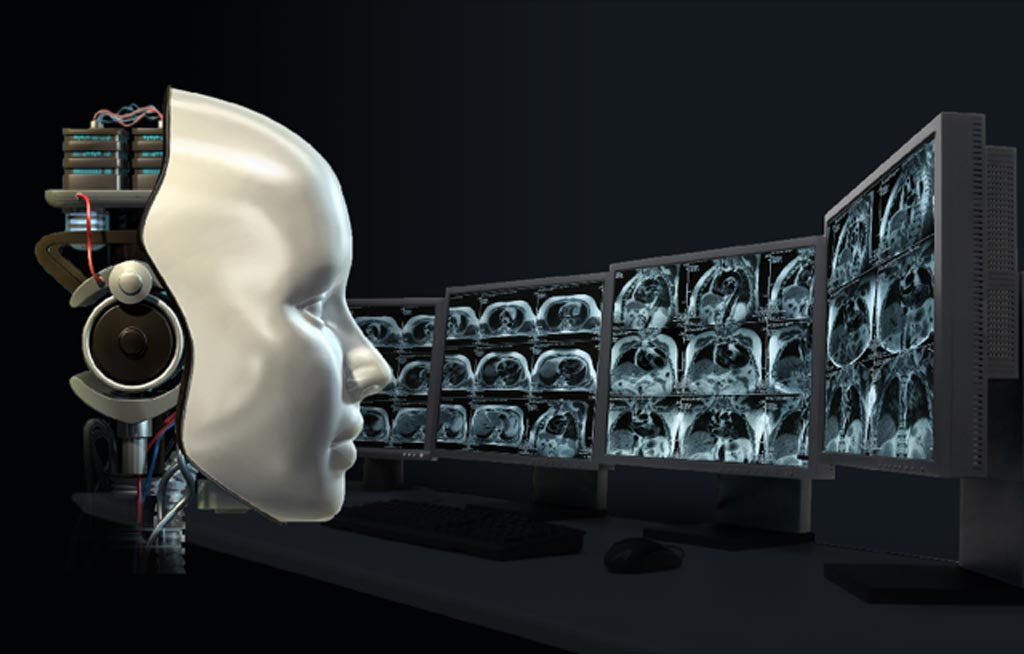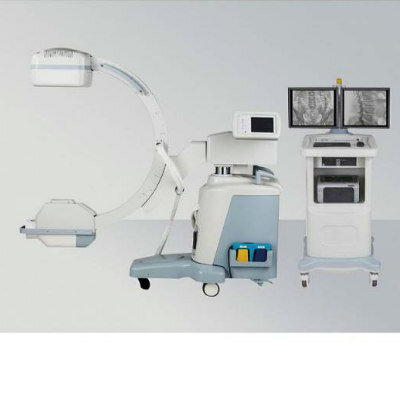Artificial Intelligence-Based Methods to Cut MRI Read Times Receives USD 250K Grant
|
By MedImaging International staff writers Posted on 23 Mar 2020 |

Illustration
Research to detect and predict blocked arteries and cardiovascular risk using knee MRI images conducted by Chun Yuan, Ph.D., Professor of Radiology and Bioengineering and Vice Chair for Global Affairs at the University of Washington (Seattle, WA, USA) has been recognized and awarded a grant by the American Heart Association’s (AHA) Institute for Precision Cardiovascular Medicine (Dallas, TX, USA).
The research was conducted through the AHA’s Precision Medicine Platform, which is powered by Amazon Web Services (AWS). The AHA, as part of its mission to be a relentless force for a world of longer, healthier lives, has collaborated with AWS to fund a competition for scientific research focused on using AI and machine learning algorithms to improve understanding of data related to precision medicine, powered by innovative cloud technology.
Dr. Yuan and his colleagues used AWS service credits to leverage the power of cloud computing, open data and new tools for AI and machine learning. Using the Precision Medicine Platform’s integrated data analytics workspace and research environment, Yuan was able to reduce the time required to read an MRI from four hours (by an expert) down to seven minutes (by a cloud-based data analysis computer program). With advanced deep learning techniques, the computer program is able to identify artery location, delineate vessel wall contours, quantify vascular features, and identify arteries with diseases from MR knee scans without any human interventions. Yuan’s work could ultimately help improve the speed with which various cardiovascular conditions are diagnosed, offer new opportunities in personalized medicine and improve quality of life for patients.
Dr. Yuan’s data science grant from the AHA Institute for Precision Cardiovascular Medicine provides USD 200,000 over two years as well as an additional USD 50,000 in AWS service credits (provided by AWS) for use on the Institute’s Precision Medicine Platform for computational time, use of AWS tools and infrastructure and data storage. As the winner of the award, Dr. Yuan received USD 10,000 in prize money from AWS and the Association’s Circulation: Genomic and Precision Medicine Journal.
“The especially exciting thing about this research is that we are able to use our technology to detect diseased blood vessels in knee images that were not acquired with that in mind,” Dr. Yuan said “as well as using artificial intelligence to greatly shorten the time it takes to review these images.”
“These awards are designed to inspire the brightest minds in computer science,” said Jennifer Hall, Ph.D., Chief of the Association’s Institute for Precision Cardiovascular Medicine. “By offering researchers like Dr. Yuan secure workspaces and new tools for data analysis, we aim to drive fresh approaches to improve Precision Medicine.”
Related Links:
University of Washington
American Heart Association’s Institute for Precision Cardiovascular Medicine
The research was conducted through the AHA’s Precision Medicine Platform, which is powered by Amazon Web Services (AWS). The AHA, as part of its mission to be a relentless force for a world of longer, healthier lives, has collaborated with AWS to fund a competition for scientific research focused on using AI and machine learning algorithms to improve understanding of data related to precision medicine, powered by innovative cloud technology.
Dr. Yuan and his colleagues used AWS service credits to leverage the power of cloud computing, open data and new tools for AI and machine learning. Using the Precision Medicine Platform’s integrated data analytics workspace and research environment, Yuan was able to reduce the time required to read an MRI from four hours (by an expert) down to seven minutes (by a cloud-based data analysis computer program). With advanced deep learning techniques, the computer program is able to identify artery location, delineate vessel wall contours, quantify vascular features, and identify arteries with diseases from MR knee scans without any human interventions. Yuan’s work could ultimately help improve the speed with which various cardiovascular conditions are diagnosed, offer new opportunities in personalized medicine and improve quality of life for patients.
Dr. Yuan’s data science grant from the AHA Institute for Precision Cardiovascular Medicine provides USD 200,000 over two years as well as an additional USD 50,000 in AWS service credits (provided by AWS) for use on the Institute’s Precision Medicine Platform for computational time, use of AWS tools and infrastructure and data storage. As the winner of the award, Dr. Yuan received USD 10,000 in prize money from AWS and the Association’s Circulation: Genomic and Precision Medicine Journal.
“The especially exciting thing about this research is that we are able to use our technology to detect diseased blood vessels in knee images that were not acquired with that in mind,” Dr. Yuan said “as well as using artificial intelligence to greatly shorten the time it takes to review these images.”
“These awards are designed to inspire the brightest minds in computer science,” said Jennifer Hall, Ph.D., Chief of the Association’s Institute for Precision Cardiovascular Medicine. “By offering researchers like Dr. Yuan secure workspaces and new tools for data analysis, we aim to drive fresh approaches to improve Precision Medicine.”
Related Links:
University of Washington
American Heart Association’s Institute for Precision Cardiovascular Medicine
Latest Industry News News
- Hologic Acquires UK-Based Breast Surgical Guidance Company Endomagnetics Ltd.
- Bayer and Google Partner on New AI Product for Radiologists
- Samsung and Bracco Enter Into New Diagnostic Ultrasound Technology Agreement
- IBA Acquires Radcal to Expand Medical Imaging Quality Assurance Offering
- International Societies Suggest Key Considerations for AI Radiology Tools
- Samsung's X-Ray Devices to Be Powered by Lunit AI Solutions for Advanced Chest Screening
- Canon Medical and Olympus Collaborate on Endoscopic Ultrasound Systems
- GE HealthCare Acquires AI Imaging Analysis Company MIM Software
- First Ever International Criteria Lays Foundation for Improved Diagnostic Imaging of Brain Tumors
- RSNA Unveils 10 Most Cited Radiology Studies of 2023
- RSNA 2023 Technical Exhibits to Offer Innovations in AI, 3D Printing and More
- AI Medical Imaging Products to Increase Five-Fold by 2035, Finds Study
- RSNA 2023 Technical Exhibits to Highlight Latest Medical Imaging Innovations
- AI-Powered Technologies to Aid Interpretation of X-Ray and MRI Images for Improved Disease Diagnosis
- Hologic and Bayer Partner to Improve Mammography Imaging
- Global Fixed and Mobile C-Arms Market Driven by Increasing Surgical Procedures
Channels
Radiography
view channel
Novel Breast Imaging System Proves As Effective As Mammography
Breast cancer remains the most frequently diagnosed cancer among women. It is projected that one in eight women will be diagnosed with breast cancer during her lifetime, and one in 42 women who turn 50... Read more
AI Assistance Improves Breast-Cancer Screening by Reducing False Positives
Radiologists typically detect one case of cancer for every 200 mammograms reviewed. However, these evaluations often result in false positives, leading to unnecessary patient recalls for additional testing,... Read moreMRI
view channel
World's First Sensor Detects Errors in MRI Scans Using Laser Light and Gas
MRI scanners are daily tools for doctors and healthcare professionals, providing unparalleled 3D imaging of the brain, vital organs, and soft tissues, far surpassing other imaging technologies in quality.... Read more
Diamond Dust Could Offer New Contrast Agent Option for Future MRI Scans
Gadolinium, a heavy metal used for over three decades as a contrast agent in medical imaging, enhances the clarity of MRI scans by highlighting affected areas. Despite its utility, gadolinium not only... Read more.jpg)
Combining MRI with PSA Testing Improves Clinical Outcomes for Prostate Cancer Patients
Prostate cancer is a leading health concern globally, consistently being one of the most common types of cancer among men and a major cause of cancer-related deaths. In the United States, it is the most... Read moreUltrasound
view channel
Largest Model Trained On Echocardiography Images Assesses Heart Structure and Function
Foundation models represent an exciting frontier in generative artificial intelligence (AI), yet many lack the specialized medical data needed to make them applicable in healthcare settings.... Read more.jpg)
Groundbreaking Technology Enables Precise, Automatic Measurement of Peripheral Blood Vessels
The current standard of care of using angiographic information is often inadequate for accurately assessing vessel size in the estimated 20 million people in the U.S. who suffer from peripheral vascular disease.... Read more
Deep Learning Advances Super-Resolution Ultrasound Imaging
Ultrasound localization microscopy (ULM) is an advanced imaging technique that offers high-resolution visualization of microvascular structures. It employs microbubbles, FDA-approved contrast agents, injected... Read more
Novel Ultrasound-Launched Targeted Nanoparticle Eliminates Biofilm and Bacterial Infection
Biofilms, formed by bacteria aggregating into dense communities for protection against harsh environmental conditions, are a significant contributor to various infectious diseases. Biofilms frequently... Read moreNuclear Medicine
view channel
New Imaging Technique Monitors Inflammation Disorders without Radiation Exposure
Imaging inflammation using traditional radiological techniques presents significant challenges, including radiation exposure, poor image quality, high costs, and invasive procedures. Now, new contrast... Read more
New SPECT/CT Technique Could Change Imaging Practices and Increase Patient Access
The development of lead-212 (212Pb)-PSMA–based targeted alpha therapy (TAT) is garnering significant interest in treating patients with metastatic castration-resistant prostate cancer. The imaging of 212Pb,... Read moreNew Radiotheranostic System Detects and Treats Ovarian Cancer Noninvasively
Ovarian cancer is the most lethal gynecological cancer, with less than a 30% five-year survival rate for those diagnosed in late stages. Despite surgery and platinum-based chemotherapy being the standard... Read more
AI System Automatically and Reliably Detects Cardiac Amyloidosis Using Scintigraphy Imaging
Cardiac amyloidosis, a condition characterized by the buildup of abnormal protein deposits (amyloids) in the heart muscle, severely affects heart function and can lead to heart failure or death without... Read moreGeneral/Advanced Imaging
view channel
PET Scans Reveal Hidden Inflammation in Multiple Sclerosis Patients
A key challenge for clinicians treating patients with multiple sclerosis (MS) is that after a certain amount of time, they continue to worsen even though their MRIs show no change. A new study has now... Read more
Artificial Intelligence Evaluates Cardiovascular Risk from CT Scans
Chest computed tomography (CT) is a common diagnostic tool, with approximately 15 million scans conducted each year in the United States, though many are underutilized or not fully explored.... Read more
New AI Method Captures Uncertainty in Medical Images
In the field of biomedicine, segmentation is the process of annotating pixels from an important structure in medical images, such as organs or cells. Artificial Intelligence (AI) models are utilized to... Read more.jpg)
CT Coronary Angiography Reduces Need for Invasive Tests to Diagnose Coronary Artery Disease
Coronary artery disease (CAD), one of the leading causes of death worldwide, involves the narrowing of coronary arteries due to atherosclerosis, resulting in insufficient blood flow to the heart muscle.... Read moreImaging IT
view channel
New Google Cloud Medical Imaging Suite Makes Imaging Healthcare Data More Accessible
Medical imaging is a critical tool used to diagnose patients, and there are billions of medical images scanned globally each year. Imaging data accounts for about 90% of all healthcare data1 and, until... Read more
















